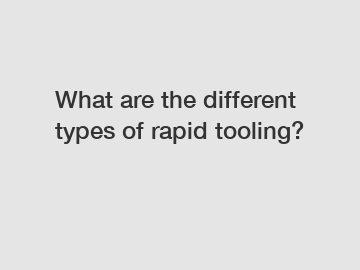What are the different types of rapid tooling?
What are the different types of rapid tooling?
Rapid tooling refers to the techniques used to produce molds and tooling quickly and efficiently. It plays a crucial role in the rapid prototyping process, allowing manufacturers to quickly iterate and test their designs. There are several different types of rapid tooling methods, each with its own unique advantages and applications.
One of the most commonly used rapid tooling methods is known as soft tooling. As the name suggests, soft tooling involves the use of relatively low-cost and easily machinable materials, such as silicone or epoxy, to create molds. This method is particularly useful for small batch production or when the design requirements are subject to frequent changes. Soft tooling allows for rapid modifications to the molds without the need for expensive and time-consuming reworks. Additionally, it offers shorter lead times, making it an ideal choice for projects with tight schedules.

Another type of rapid tooling is known as prototype molds or rapid tool inserts. These molds are typically made from aluminum or a similar material and are used for low-volume production runs. Prototype molds offer a relatively low cost and fast turnaround time, making them a popular choice for small-scale production or when the demand for the product is uncertain. However, they may not be suitable for high-volume production due to their limited durability.
Additional reading:Is it worth investing in multi-diameter pipeline pigs?
Are CPS Diamond Tools the Future of Construction?
What is the history of Morse taper?
Why Pigging Receiver Maintenance is Essential for Pipeline Efficiency
Best tips for selecting diamond core drill bits for granite?
Which material is used for elbows?
Where do you usually find DC motors?
For high-volume production, production tooling is often preferred. Production tooling involves the use of materials such as steel or hardened aluminum to create molds that can withstand the high pressures and temperatures associated with mass production. While production tooling requires a longer lead time and higher upfront cost compared to other rapid tooling methods, it provides exceptional durability and consistency. This makes it the go-to choice for large-scale manufacturing operations.
The emergence of advanced technologies, such as 3D printing, has also revolutionized the field of rapid tooling. Additive manufacturing, particularly selective laser sintering (SLS) or direct metal laser sintering (DMLS), can be used to create complex molds directly from digital designs. This eliminates the need for traditional mold-making processes and reduces both time and costs. 3D-printed tooling offers the advantage of enhanced design flexibility and enables the production of intricate shapes that were previously not feasible.
In conclusion, the different types of rapid tooling offer manufacturers a range of options to meet their specific needs. From soft tooling for rapid modifications to production tooling for high-volume manufacturing, each method has its own set of advantages and applications. The continuous advancements in additive manufacturing further expand the possibilities of rapid tooling, making it an indispensable component of the modern manufacturing landscape.
Want more information on oem rapid tooling supplier, china low volume manufacturing factory, automotive parts rapid tooling? Feel free to contact us.
Additional reading:5 Essential Welding Tips for Beginners: Master the Art of Welding
How to Choose the Best High Speed Cylinder?
Should I opt for metal pickets for my business?
Will a stainless steel trash can rust?
Revolutionizing Urban Farming with Square Mills?
What not to use on polished concrete?
Maximizing Efficiency: The Power of Machining Services
179
0
0
Related Articles
-
Ultimate Guide: Pipe Pup Piece Price and Hot Topics Uncovered
Ultimate Guide: Pipe Pup Piece Price and Hot Topics Uncovered.
166
0
0
-
170
0
0
-
Revolutionizing Farming Industry with Pneumaticchick Technology: How?
Revolutionizing Farming Industry with Pneumaticchick Technology: How?
142
0
0
-
5 Stunning Metal Round Staircase Ideas to Enhance Your Home
## 5 Stunning Metal Round Staircase Ideas to Enhance Your Home.
125
0
0
-
160
0
0
-
Revolutionizing Industrial Efficiency: Mono Pump Stator Replacement?
Are you looking to revolutionize industrial efficiency at your workplace?
153
0
0
-
168
0
0
-
Revolutionizing the Injection Mold Cycle: Are Slow Cycles Really Better?
### Revolutionizing the Injection Mold Cycle: Are Slow Cycles Really Better?
169
0
0










Comments
All Comments (0)